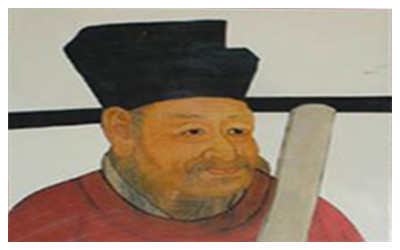
Bao Zheng 包拯
 Bao Zheng 包拯 (999— 1062), courtesy name Xiren, a native of Hefei, Anhui Province, was a renowned upright official and a politician in the Northern Song Dynasty.
Bao Zheng 包拯 (999— 1062), courtesy name Xiren, a native of Hefei, Anhui Province, was a renowned upright official and a politician in the Northern Song Dynasty.
In the 5th year of Tiansheng Reign (1027), he passed the highest-level imperial examination and became qualified as a Jinshi. After his parents’ demise, Bao was appointed as magistrate of Tianchang County, but he deferred embarking on his official career for a decade in order to care for his elderly parents and faithfully observe proper mourning rites after their deaths. After he finished wearing the willow, Bao Zheng began to take office as a magistrate of Tianchang County not far from his hometown. It was here that Bao first established his reputation as an astute judge.
He held the posts of magistrate, prefecture head, the imperial censor, a cabinet official, and an assistant minister. He was offered the title of Minister of Rites posthumously, and was respected as Lord Bao Xiaosu.
His name is always connected with the reputation for his uncompromising stance against corruption among the government officials at the time. He upheld justice and refused to yield to higher powers including the “royal father-in-law” who treated Bao as an enemy. Bao Zheng set up a stone stele at his house in his evening years on which his Lord Bao’s Family Regulations was engraved. The work he left is Bao Zheng’s Memorials to the Throne. His stories are popular in folk, and are often the materials of novels and operas. His name became synonymous with justice, with the clear blue sky became a popular metaphor to justice in the Chinese speaking world.







 Ask Questions ?
Ask Questions ?